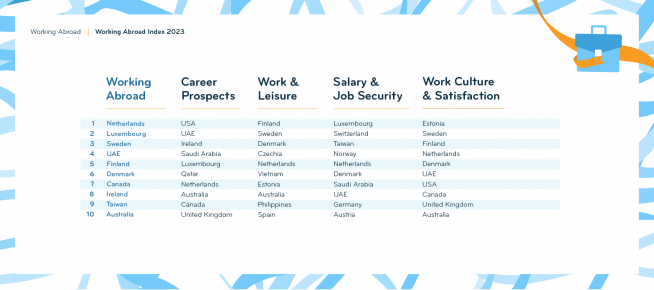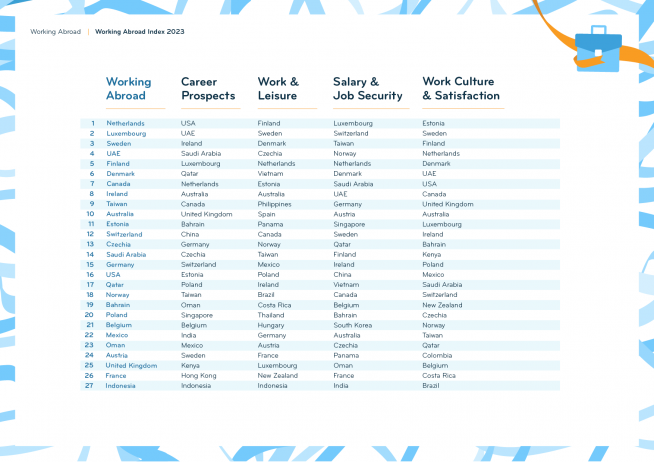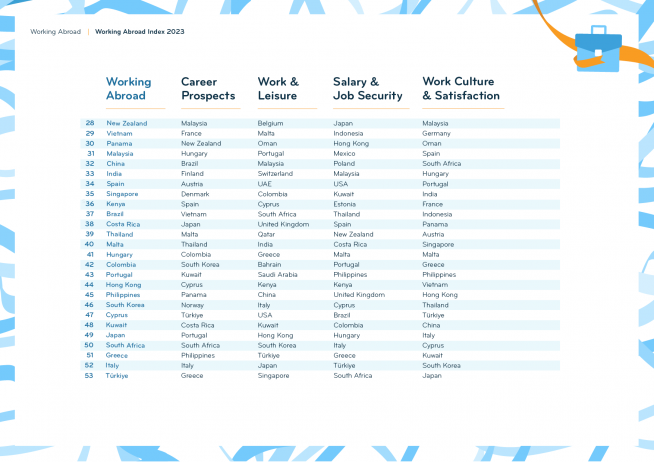Passport to Success: The Top (& Bottom) Places for Working Abroad in 2023
Top Findings
- Expats in the Netherlands (#1) love the local business culture.
- Luxembourg (#2) boasts a strong economy and great career prospects.
- The work-life balance is what makes Sweden (#3) an attractive location.
- Türkiye (#53), Italy (#52), and Greece (#51) rank in the bottom 3 of the index.
- Luxembourg and Finland are among the biggest winners in 2023.
- Singapore, South Korea, Belgium, and the UK have lost the most places in the survey.
The Top 10
Methodology
The Working Abroad Index of the Expat Insider 2023 survey features 53 destinations worldwide with a sample size of at least 50 respondents each. Its results are based on four subcategories: Career Prospects, Salary & Job Security, Work & Leisure, and Work Culture & Satisfaction. Each subcategory consists of two to five single factors each that were rated on a scale of one (very bad) to seven (very good).
#1 Netherlands — Boasting a Fantastic Business Culture
Expats in the Netherlands are very happy with the local business culture. According to the majority of them, it allows for a lot of flexibility (84% vs. 60% globally), promotes independent work and flat hierarchies (78% vs. 46%), and also encourages creativity (73% vs. 51%). Nearly three-quarters of expats there (74%) are generally satisfied with their job (vs. 64% globally). But only 77%, close to the global average of 78%, actually see a purpose in their work.
The country shows a great performance in the Work & Leisure Subcategory (5th), though. “The work-life balance is awesome,” says one expat from Mexico, and this sentiment is also reflected in the survey results. More than three-quarters (76%) are happy with their work-life balance in the Netherlands (vs. 63% globally), nearly one-third (32%) even very much so (vs. 26% globally). A similar share (74%) are happy with their working hours, ten percentage points above the global average of 64%.
When it comes to job security in the Netherlands, 72% rate this factor positively (vs. 59% globally). The state of the economy impresses survey respondents as well, as 87% are happy with this factor (vs. 62% globally), and more than a third (35%) give it the best possible rating (vs. 25% globally). And expats there generally agree that they are paid fairly for their work (71% happy vs. 62% globally).
More than half of the expats in the Netherlands (56%) are also happy with the local job market (vs. 47% globally). Moving there has improved their career prospects (69% happy vs. 59% globally), and 65% rate their personal career opportunities positively (vs. 57% globally).
#2 Luxembourg — A Stable Economy & Great Career Prospects
Luxembourg takes 2nd place in the Working Abroad Index. The local economy is a big driver of this success — the vast majority of expats in Luxembourg (96%) rate it positively (vs. 62% globally). And 68% even give it the best possible rating, compared to only 25% globally.
More than three-quarters (77%) are happy with their job security in Luxembourg (vs. 59% globally). The country is also a great destination for all expats looking for better career prospects: 73% say that these have improved after their move (vs. 59% globally) — 41% even give the best possible rating (vs. 32% globally). Nearly two-thirds (66%) say that they are happy with their personal career opportunities, compared to a global average of 57%. “It’s a multi-cultural and business-minded culture,” one Belgian expat explains.
The job satisfaction in Luxembourg is high for three-quarters of survey respondents (75%), compared to 64% globally. When it comes to the local business culture, 66% say that it supports flexibility (vs. 60% globally), and 60% agree that it encourages creativity and thinking outside the box (vs. 51% globally). Although 81% of expats there see a purpose in their work (vs. 78% globally), they are less likely than the global average to give it the best possible rating (33% vs. 40% globally).
Two-thirds (67%) are generally happy with their working hours in Luxembourg (vs. 64% globally), and 70% are satisfied with their work-life balance, compared to 63% globally.
#3 Sweden — The Place for a Happy & Balanced Work Life
Expats who value a good balance of work and leisure should head to Sweden. Nearly four in five (79%) are happy with their work-life balance there (vs. 63% globally). At 40.6 hours a week, the average among expats working full time is significantly below the global average of 42.7 hours. So, it may not come as a surprise that 79% are satisfied with their working hours (vs. 64% globally).
“Here, you have the possibility to have a good balance between work and your personal life.” – Italian expat
Sweden also ranks 2nd in the Work Culture & Satisfaction Subcategory. Nine in ten expats in Sweden (90%) say that the local business culture supports flexibility (vs. 60% globally), and 43% even agree completely (vs. 22% globally). According to expats, it also promotes independent work and flat hierarchies (80% vs. 46% globally) as well as encourages creativity and thinking outside the box (67% vs. 51% globally).
Many expats in Sweden, 86% to be precise, see a purpose in their work (vs. 78% globally), and 68% are generally happy with their job, a little more than the global average of 64%.
Over seven in ten (71%) are happy with their job security (vs. 59% globally), and 77% rate the state of the Swedish economy positively (vs. 62% globally). More than half (52%) are also happy with the local job market (vs. 47% globally).
Where Work Is Not Fun: The Bottom 3
Türkiye occupies last place (53rd) in the Working Abroad Index. The state of the Turkish economy is a strong reason for concern among expats: 58% are unhappy with it (vs. 17% globally). And 27% even give it the worst possible rating, nine times the global average of 3%! “The economy is immediately affected by world situations,” says one expat from Pakistan. The job security, which three in ten (30%) rate negatively (vs. 19% globally), also leaves a lot to be desired. And only 54% say that they are paid fairly for their work, compared to 62% globally.
Expats in Türkiye are also missing a good work-life balance: a quarter (25%) rate it negatively (vs. 17% globally), and three in ten (30%) are unhappy with their working hours (vs. 16% globally). And although work seems to dominate many expats’ lives in Türkiye, career opportunities are few and far between: 32% rate their personal career opportunities negatively, ten percentage points more than the global average of 22%. Only 43% say that moving to Türkiye has actually improved their career prospects (vs. 59% globally).
Less than half of the survey respondents in Türkiye (47%) are actually happy with their job (vs. 64% globally). And nearly twice the global average (35% vs. 18% globally) say that the local business culture does not support flexibility.
Italy ranks 52nd in the Working Abroad Index. Close to two in five expats there (38%) find their personal career opportunities leave a lot to be desired (vs. 22% globally), and 47% rate the local job market negatively (vs. 26% globally). A third (33%) do not think that moving to Italy has increased their career prospects (vs. 18% globally). According to a survey respondent from Argentina, new labor laws, which introduced looser rules for short-term contracts, might have something to do with that: “The problem is the new labor laws that established very short contracts with no renewals, and so many people got caught in this system.”
Only about two-fifths (43%) are happy with their job security in Italy (vs. 59% globally), and 24% say that they are not paid fairly for their work (vs. 19% globally). Less than three in ten (29%) are happy with the state of the Italian economy (vs. 62% globally).
Job satisfaction is rather low among survey respondents in Italy: only 48% are happy with their job (vs. 64% globally). And just a quarter (25%) agree that the local business culture promotes independent work and flat hierarchies (vs. 46% globally).
The career prospects in Greece (51st) are not great, either. A third (33%) rate their personal career opportunities negatively (vs. 22%), and 40% say that moving to Greece has not improved their career prospects (vs. 18% globally).
Another 33% are not happy with their job security (vs. 19%), while only a quarter (25%) regard the state of the economy positively, compared to a whopping 62% globally. Fair pay is also not a strong suit of the Aegean country: 13% say that they are not paid fairly at all for their work (vs. 6% globally).
“It’s difficult to find a job in Greece.” – Ukrainian expat
The Greek business culture is another low point. Less than a third (32%) believe that it promotes flat hierarchies and independent work (vs. 46% globally), and 29% say that it does not support flexibility (vs. 18% globally).
Trends in the Top 10
- Netherlands
- Luxembourg
- Sweden
- UAE
- Finland
- Denmark
- Canada
- Ireland
- Taiwan
- Australia
Of the five Northern European countries that are included in the Expat Insider 2023 survey, three rank in the top 10 of the Working Abroad Index. Aside from Sweden (3rd), Finland (5th) and Denmark (6th) are also popular when it comes to work-related topics. The results of these three countries are fairly similar. They all perform well in the Work & Leisure Subcategory (Finland ranks 1st, Sweden 2nd, and Denmark 3rd), as well as Work Culture & Satisfaction (Sweden ranks 2nd, Finland 3rd, and Denmark 5th). But career prospects are only mediocre: half of the expats in Denmark (50%), 48% of expats in Finland, and 61% in Sweden say that moving improved their career prospects (vs. 59% globally).
Three other European destinations also place in the top 10 of the Working Abroad Index: the Netherlands (1st) and Luxembourg (2nd) are joined by Ireland (8th). Much like expats in the Netherlands and Luxembourg, survey respondents in Ireland appreciate the Career Prospects. Ireland ranks 3rd in this subcategory. However, only 74% see a purpose in their work, slightly less than the global average of 78%.
Trends in the Bottom 10
- Hong Kong
- Philippines
- South Korea
- Cyprus
- Kuwait
- Japan
- South Africa
- Greece
- Italy
- Türkiye
With Türkiye (53rd), Italy (52nd), Greece (51st), and Cyprus (47th), four Southern European countries are found in the bottom 10 of the index. All these countries achieve relatively bad results across the board. Unlike its “neighbors” in the bottom 3, however, Cyprus performs slightly better in the Work & Leisure Subcategory: 60% rate the work-life balance positively, close to the global average of 63%.
There are four Asian destinations that rank in the bottom 10: Japan (49th), South Korea (46th), the Philippines (45th), and Hong Kong (44th). Work & Leisure is a particular problem in Japan, South Korea, and Hong Kong — they all rank in the bottom 10 of this subcategory — while the Philippines (9th) performs quite well in that area. On the other hand, this country shows the worst results when it comes to Career Prospects (51st).
But these destinations do not perform poorly across the board. Expats in the Philippines see a purpose in their work (87% vs. 78% globally) and are overall happy with their jobs (72% vs. 64%). Survey respondents in South Korea are happy with the state of the economy (70% vs. 62%), and expats in Hong Kong say that moving there has improved their career prospects (65% vs. 59%).
Still, the bad results in the Working Abroad Index might be especially difficult to swallow for expats in Hong Kong and South Korea where 61% and 42%, respectively, moved for work-related reasons (vs. 35% globally).
The Biggest Winners
Aside from Luxembourg, which ranked 27th in 2022 and comes in 2nd in 2023, Oman is one of the biggest winners of this index. It gains 16 places, ranking 23rd in 2023 compared to 39th in 2022. The country has made the biggest strides in the Career Prospects (from 40th to 19th in 2023) and Salary & Job Security (41st to 26th) Subcategories.
Finland (5th) has improved across almost all factors, after it ranked 20th in 2022. Expats see better Career Prospects than they did last year. The country leaves the bottom 10 of this subcategory (44th in 2022) behind and climbs to 33rd place. It also shows a lot of improvement in the Work & Leisure Subcategory, where it ranks 1st across the board — compared to its 10th place in 2022.
The Biggest Losers
Singapore, South Korea, Belgium, and the UK, on the other hand, are among the biggest losers in the Working Abroad Index in 2023.
Singapore dropped from 18th place in 2022 to 35th in 2023, showing a (at times massive) loss across all subcategories of the Working Abroad Index. In 2023, the destination ranks last (53rd) in the Work & Leisure Subcategory, a significant change from its 33rd place in 2022. While Singapore could be found in the top 10 of the Career Prospects Subcategory in 2022, it only makes it to 20th place in 2023. When it comes to overall job satisfaction, it drops from 8th place in 2022 to 46th in 2023.
It does not look much better for South Korea, which only ranks 46th in 2023, a 15-rank drop from 31st in 2022. The country sees the biggest losses in the Career Prospects Subcategory where it ranks 42nd (compared to a 23rd place in 2022). Survey respondents are also unhappy with their working hours and work-life balance in South Korea, as the country drops to 50th place in the Work & Leisure Subcategory, from 34th place in 2022.
While Belgium still receives solid ratings across the board, landing the country in 21st place in 2023, it does significantly worse than in 2022, when it ranked 10th. Belgium shows losses across all the factors of the index, but especially so when it comes to overall job satisfaction. The country ranked 10th for this factor in 2022 but only 31st in 2023.
The UK still makes it to the top 10 in the Career Prospects (10th) and Work Culture & Satisfaction (9th) Subcategories, even gaining one rank in the latter. Still, it shows losses across almost all other areas, causing a drop from 15th place in 2022 to 25th in 2023 in the Working Abroad Index. The country does especially poorly for Salary & Job Security, where it drops to 45th place in 2023 from 27th place in 2022. The results for the UK’s state of the economy shows the biggest change in the index: while 64% rated this factor positively in 2022, only 38% still share this point of view in 2023.
Full Ranking
Further Reading
- Expat Insider 2023: Get the full PDF report
- Reuters — Italy approves May Day labour package amid union criticism
- Finland Outperforms Sweden, Denmark & Norway in the Eyes of Expats
- Working Life Is a Nightmare for Expats in Italy
- Working Abroad Index 2022: From Great Job Markets to a Lack of Career Opportunities






